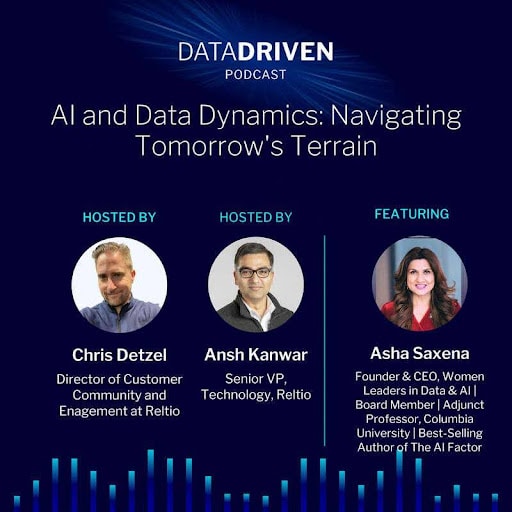Unlocking the AI Factor: Asha Saxena’s roadmap for enterprise transformation

The recent explosion of generative AI and large language models (LLMs) like ChatGPT has sparked both excitement and apprehension in enterprise technology. While the potential is immense, the road to successfully implementing AI remains challenging. Enterprises need timely and trusted information for AI to thrive, but many companies struggle bridging the trust gap in their data.
In a recent DataDriven Podcast interview, Ansh Kanwar, Reltio’s Executive Vice President of Technology, Product and Strategy, interviewed Asha Saxena, a veteran tech entrepreneur and author of “The AI Factor.” Saxena shared that LLMs and AI is here to stay and outlined some steps that companies can take to adjust to the AI-driven landscape.
Launching Women Leaders in Data & AI
Saxena has a long and impressive career spanning multiple decades in technology. In addition to writing a cutting-edge book on AI, she’s launched multiple startups and has taught at Columbia University. Her passion for responsible AI development led her to launch Women Leaders in Data & AI (WLDA) during the COVID-19 pandemic. Recognizing that AI models may amplify societal biases without diverse voices, WLDA brings together senior leaders from companies across industries, including finance, technology and consumer goods to champion parity and ethics in data and AI. “If we don’t have women and minorities’ voices included, we’ll only amplify the biases coded into the models,” Saxena said.
Bridging the gap between technologists and business leaders
Saxena’s work, noted in her book, seeks to bridge the gap separating the business and technology worlds. She shows leaders how to drive real value from AI investments. Drawing from her 28 years of experience building data-driven companies, she outlines practical frameworks that cut through the hype and lay the groundwork for sustainable AI adoption. The biggest friction point she noted is that technologists and business leaders frequently don’t understand each other. Cutting through the noise and building a culture fostered on driving results can ease the friction and help business thrive on data rather than continue to be hamstrung by it.
Central to her approach is the “Data Performance Index” – a quantitative tool for evaluating potential data projects based on their projected business value and data quality. “It’s not about just the raw data,” Saxena explains. “If you don’t know what problem you’re solving, data is just data.” By marrying business metrics with data indicators, companies can systematically prioritize high-value AI use cases.

Data-ready enterprises can thrive with AI
Another cornerstone of her book is the “Data Readiness Framework,” which diagnoses obstacles preventing organizations from extracting full value from their data assets. Saxena identifies four key pillars: clear objectives, robust data management, user engagement, and transformational impact. Deficiencies in any of these areas can derail AI initiatives before they start.
A recurring theme Saxena has is the pivotal role of data governance. “Not having clear definition of who owns the data” is a major stumbling block she frequently encounters. CDOs often become mere “order takers” rather than value creators when data ownership and priorities are ambiguous.
Embracing the future of AI, fueled by trusted data
More than a year after the launch of ChatGPT, AI continues to drive significant interest in every corner of society. The gamut of emotions runs from wild optimism to fearful panic. Saxena’s core message is AI pragmatism rather than avoidance. “You can’t run away from AI. You can’t hide under the covers and say it’s just hype,” she advises. Instead, companies should dive in cautiously, take incremental steps and celebrate small wins along the way. Her advice boils down to: Get started, but start smart. Embrace AI decisively yet incrementally. Let data readiness and value steer your course. Celebrate small wins as stepping stones to greater AI maturity. Perhaps most crucially, you should govern your data judiciously to uphold ethics alongside innovation and growth aspirations.
A data-centric approach could determine which companies succeed or fail in an AI-driven world by bridging technological possibilities with business realities.